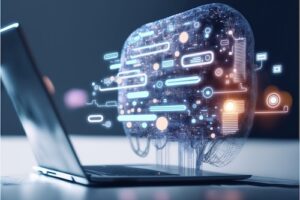Key points:
- AI can provide new opportunities and allow us to see things differently
- AI tools can help create learner profiles to give educators a more accurate impression of students
Learning now is so much more than making notes from a textbook and critiquing other people’s ideas. It is cultivating your own vision of the future and how things can be improved to better our lives and advance the next generation. AI technology is a key driver in this change and will enable students to have a deeper understanding of global events and how they can make an impact. Personalization in education is just one pillar of AI that I want to explore.
In many ways, AI is an extension of ourselves. It can help offload the typically boring tasks we have to put up with and realise our potential by accessing new information and learning at our own speed.
In education, this can mean what we want to study next or what kind of role we want for ourselves once we leave school. It is important to note that AI isn’t just a tool that can take things away; it can provide new opportunities and allow us to see things differently. Personalizing education can help students find their way and equip them with the skills they desire.
Customizable courses
Having a fixed curriculum does not serve the interests of all students. When lessons are dictated by the teacher, government, and exam body, the student is left out of the decision-making despite being on the receiving end. In education, AI can help rectify this by making learning customizable. Granting autonomy to the student is really important, and trusting younger minds with new technology will help unlock talent and provide more individual thinking.
AI can enhance personalization in education by assessing a learner’s interests, prior knowledge, and determining what type of courses would suit their abilities. Allowing the student to pick what they learn from the options available–for example, entrepreneurial skills–will unleash their creativity and give them the confidence to develop their skills.
Intelligent tutoring
Intelligent tutoring can partner well with customizable courses. AI-enabled tutoring systems can interact with students in a personalized manner by observing their understanding of concepts, statistics, etc. In addition, learning at your own pace can also be achieved through intelligent tutoring. It works because it’s on demand, feeding the student with up-to-date information and monitoring their progress, weak areas, and how they are learning. Moreover, real-time feedback is difficult for a teacher to provide to a class or a single student, so virtual assistants can take on this task and help teachers facilitate student-led learning.
Be your own advocate
Aside from the in-school benefits, AI is capturing the entrepreneurial spirit in students and handing them the tools to be future leaders. Predictive analysis is one of the major tools that will aid students who wish to start their own business. AI support systems can analyze and predict trends and sources to give you the best indication of what the outcome would be. In business this entails coming up with a proposal, analyzing figures, and making predictions.
Further, this can be applied in a school setting to assist in tasks and teach students how to use tools that will make their jobs easier and more efficient–for example, proofreading work and highlighting grammar and spelling errors. AI is not a cheat, but an assistant that streamlines the vast curriculum and narrows it down to the individual to keep them in line with their path and goals for the future.
Being a business leader involves a magnitude of decision-making. Knowing the best interests of the company and understanding markets, global events, and people is a difficult task to navigate. AI can help manage this by helping students speak up for themselves by keeping them informed with the latest information.
Gen Z makes up the majority of undergraduates, and by 2025 they are expected to account for 27 percent of the global workforce. With this in mind, it is important to highlight the ways AI can aid their adjustment from school life to working life. Generation Z is going to shape the world and so it is imperative their ideas are supported and materialized with the help of technology.
Creating learner profiles
AI tools can group individuals based on their skills, personality, talents, etc., using a test that determines what type of learner they are and what interests them. Creating learner profiles will give educators a better and more accurate impression of students, because currently, grades are the only metric applied when deciding who is doing well and who needs extra help. For students who struggle with exams and revision, this puts them at a great disadvantage because it indicates they’re not as astute as others, when actually, they are very smart and simply learn in their own way. Having a learner profile will put students on the right pathway and lead them to the types of businesses they wish to create.
AI can do so much more than just be a practical tool–it can also be used holistically. As humans, we are constantly striving for ways to self-improve, and AI can help us achieve that.
Socialization shouldn’t be neglected in personalizing education, and AI-powered virtual classrooms can simulate real-world environments that can facilitate socialization between students with avatars, interactive games, and chat boxes. The ethical considerations of AI should be understood, but maintaining it alongside human support will ensure risks are limited.
If we want the next generation to be leaders in tech and innovation, we need to supply them with the tools today to realize AI strategies and negotiate their careers with these new types of technology. The possibilities with AI in education are endless.
Related:
Are educators using ChatGPT to write lesson plans?

